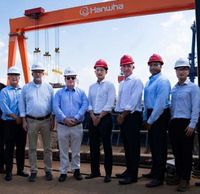In a significant move set to reshape the global shipbuilding landscape, South Korea's top shipbuilding giants—Hyundai Heavy Industries, Hanwha Ocean, and Samsung Heavy Industries—have joined forces with the Korea Shipbuilding and Offshore Technical Association to form a joint task force. This collaboration aims to support the ambitious "Make American Shipbuilding Great Again" (MASGA) initiative, designed to revitalize the US shipbuilding sector through substantial foreign investment and strategic cooperation.
The MASGA initiative is a centerpiece of a broader $350 billion investment package that South Korea has pledged to inject into the United States. Central to this package is the commitment of approximately $150 billion directed specifically towards the shipbuilding industry—the largest single-industry investment within this multi-sector deal. In exchange, the US administration under President Donald Trump has agreed to reduce tariffs on South Korean imports from 25% to 15%, signaling a thaw in trade tensions and an opening for deeper industrial collaboration.
This substantial financial commitment is not just about capital infusion but also about fostering a comprehensive partnership. The MASGA project encompasses plans to construct new shipyards across the United States, develop advanced training systems for shipbuilding personnel, rebuild and strengthen related supply chains, and engage in cooperative activities in maintenance, repair, and overhaul (MRO) operations. These efforts collectively aim to rejuvenate the American shipbuilding industry, enhance its competitiveness, and secure its future in a rapidly evolving global market.
According to a Korean official involved in the initiative, the newly established joint task force will serve a critical role in coordinating and facilitating cooperation between South Korean companies and the US government. This body is tasked with ensuring that the MASGA project's implementation proceeds smoothly, aligning the interests of private enterprises with public sector objectives. The official emphasized, "There will be many ways to implement Korea-US shipbuilding cooperation. The task force will focus on supporting and promoting these efforts. The Korean shipbuilding industry is working closely with the government on the MASGA project through this task force."
Adding to the momentum, key US officials have shown active interest in the initiative. On July 30, 2025, Russell Vought, Director of the White House Office of Management and Budget, and John Phelan, US Navy Secretary, visited the Hanwha Philly Shipyard facilities in Philadelphia. Their visit underscored the US government's commitment to supporting the revitalization of its shipbuilding capabilities and highlighted the strategic importance of the partnership with South Korean firms.
Despite the enthusiasm, some procedural hurdles have emerged. High-level trade negotiations between South Korea and the US, initially scheduled for late July 2025 in Washington, were postponed due to an unexpected scheduling conflict involving US Treasury Secretary Scott Bessent. Nevertheless, discussions are expected to resume with vigor from mid-August 2025, following the summer break observed by the shipbuilding industry.
The MASGA project is poised to have far-reaching implications. By facilitating the construction of new shipyards, it will create jobs and stimulate economic activity in regions across the United States. The focus on personnel training will help develop a skilled workforce capable of meeting modern shipbuilding demands. Meanwhile, rebuilding supply chains will enhance resilience and reduce dependency on foreign components, a lesson underscored by recent global disruptions.
Moreover, the cooperative approach to MRO activities promises to extend the operational lifespan of existing vessels, improve fleet readiness, and reduce costs for the US Navy and commercial operators alike. This comprehensive strategy reflects a shared vision between South Korea and the United States to not only boost production capacity but also enhance the quality and sustainability of shipbuilding operations.
South Korea's leadership in the shipbuilding sector is well established, with companies like Hyundai Heavy Industries, Hanwha Ocean, and Samsung Heavy Industries recognized globally for their technological prowess and production scale. Their engagement in the MASGA initiative signals a strategic pivot that leverages their expertise to bolster US industrial capabilities, creating a win-win scenario for both nations.
In addition to the MASGA initiative, South Korea's commitment to expanding its maritime influence is evident domestically. According to Vietnam's Department of Maritime and Inland Waterways, the size of Vietnam's merchant fleet is projected to increase to 1,750 vessels with a total tonnage of 18 million tons by 2030, reflecting broader regional growth in maritime industries and the importance of shipbuilding expertise.
As the MASGA project moves forward, the joint task force will play a pivotal role in navigating the complexities of cross-border industrial collaboration. The initiative represents a bold step toward revitalizing a critical American industry while strengthening economic ties between South Korea and the United States. With detailed discussions set to intensify soon, industry watchers and stakeholders alike will be closely monitoring how this unprecedented investment and cooperation unfold.




